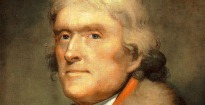Scholars Find Trove of Books from Jefferson's Library
 The New York Times reports:
The New York Times reports:
A literary detective story that began 18 months ago and was advanced through a chance reading of an 1880 edition of The Harvard Register has led researchers from the Jefferson Library at Monticello to a trove of books that were among the last ones that Thomas Jefferson, the nation’s most bibliophilic president, collected and read in the decade before he died.
The 28 titles in 74 volumes were discovered recently in the collection of Washington University in St. Louis, immediately elevating its library to the third largest repository of books belonging to Jefferson after the Library of Congress and the University of Virginia.
“My reaction was: ‘Yes! It makes sense,’ ” said Shirley K. Baker, Washington University’s vice chancellor for scholarly resources and dean of university libraries. “It strikes me as particularly appropriate these are in Missouri. Jefferson bought this territory, and we in Missouri identify with him and honor him. And I was thrilled at the detective work our curators had done.”
The Washington University library learned of the Jefferson bonanza a few months ago from Endrina Tay, project manager for the Thomas Jefferson’s Libraries project at Monticello, the former president’s home near Charlottesville, Va., a National Historic Landmark. She has been working since 2004 to reconstruct Jefferson’s collection and make the titles and supplemental reference materials available online. Jefferson had several collections, including 6,700 books that he sold to the Library of Congress in 1815 after the British burned Washington. Writing to John Adams that “I cannot live without books” and confessing to a “canine appetite for reading,” Jefferson immediately started another collection that swelled to 1,600 books by the time he died on July 4, 1826. That collection became known as his retirement library.
Those books were dispersed after Jefferson’s heirs reluctantly decided to sell them at auction in 1829 to pay off Jefferson’s debts; auction catalogs survive, but not a record of who bought the books.
Click here to read more.

